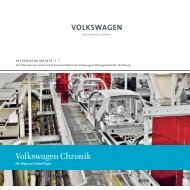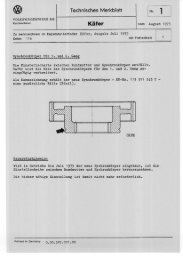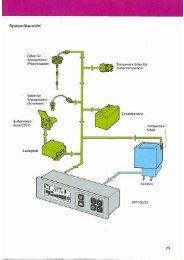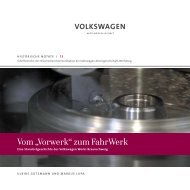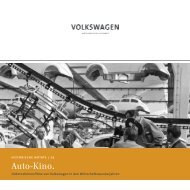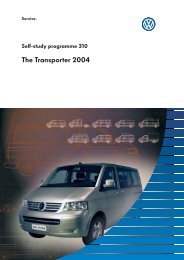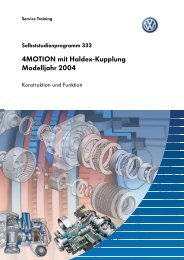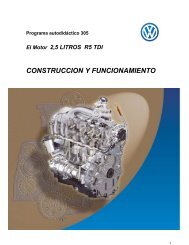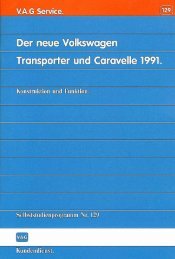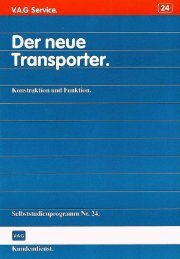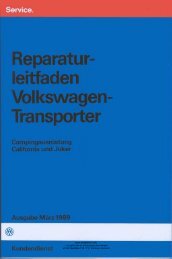HN 2: The British and their Works
HN 2: The British and their Works
HN 2: The British and their Works
You also want an ePaper? Increase the reach of your titles
YUMPU automatically turns print PDFs into web optimized ePapers that Google loves.
<strong>The</strong> co-operation of the works council was also indispensable to<br />
management for the internal transfer of employees from nonproductive<br />
to productive departments. "If we have this<br />
(co-operation)," said Münch, "then it will not fail through any<br />
fault of ours". 128 <strong>The</strong> works council supported this measure,<br />
because it saw it as an opportunity to place qualified people in<br />
better wage groups. <strong>The</strong> management was required as far as<br />
possible to employ every person in a position to which they were<br />
suited, although the works council urged that implementation<br />
should not be allowed to lead to losses in earnings. <strong>The</strong>re was<br />
little leeway for general improvements to incomes, as the Allies<br />
had imposed a wage <strong>and</strong> price freeze throughout Germany.<br />
Nevertheless, this did not prevent slight progress on the<br />
subject of wage policy. <strong>The</strong> works council was therefore able to<br />
negotiate for young people under 21 <strong>and</strong> women on piecework<br />
at the Volkswagen plant to be paid the same wages as adult<br />
male pieceworkers. 129<br />
While in 1947 hunger <strong>and</strong> economic misery triggered strike<br />
movements throughout Germany, Volkswagen weathered this<br />
period without significant protest actions from its workforce.<br />
Any attempts in this direction were successfully warded off by<br />
management <strong>and</strong> works council jointly, <strong>and</strong> in this <strong>their</strong> work<br />
was made easier by the composition of the workforce. <strong>The</strong> refugees<br />
<strong>and</strong> freed prisoners of war relied on social fringe benefits<br />
from the company, <strong>and</strong> in particular on the factory-owned<br />
accommodation, a fact which dampened <strong>their</strong> enthusiasm for<br />
strikes. 130 Significantly, the near-strike at the Vorwerk was not<br />
about materialistic improvements, but was triggered by the<br />
denazification procedure in Braunschweig where, in the view of<br />
many union <strong>and</strong> works council members, an excessively lenient<br />
verdict had been issued to two former SA men. In December<br />
1947, therefore, the employee representatives discussed the<br />
possibility of a strike in which the Vorwerk should also take part.<br />
General manager Münch immediately contacted the works<br />
council secretary Fritz Hesse <strong>and</strong> gave him to underst<strong>and</strong> that a<br />
strike "could be extremely disruptive at this time, because we<br />
have the special programme for December to cope with." 131 In a<br />
veiled threat he reminded Hesse that the Vorwerk had already<br />
participated in the strike movement in April of that year, when<br />
practically the whole of Germany was out. According to Münch,<br />
the works council there had got away with it that time because<br />
Münch had personally interceded with the Military<br />
Government. Hesse <strong>and</strong> Münch were agreed that the strike<br />
must be prevented. <strong>The</strong> works council intervened at the<br />
Vorwerk, whereupon the workers voted against taking part. On<br />
the same day, the general manager gave the Senior Resident<br />
Officer the strike all-clear.<br />
In Münch the works council found a kindred spirit who was also<br />
striving for agreed solutions <strong>and</strong> preferred the way of industrial<br />
peace. In the debate on the increase of working hours in mid-<br />
1946 Münch pressed for the inclusion of the employees’ representation,<br />
especially since the plans could only be implemented<br />
with difficulty if it were to resist them. <strong>The</strong> works<br />
council exploited this favourable situation to make progress in<br />
the matter of co-determination in accordance with the Allied<br />
<strong>Works</strong> Councils Act of April 1946. It was precisely this matter that<br />
brought the negative aspect of <strong>British</strong> pragmatism to light, a<br />
perfect example of which is the employee representation’s



